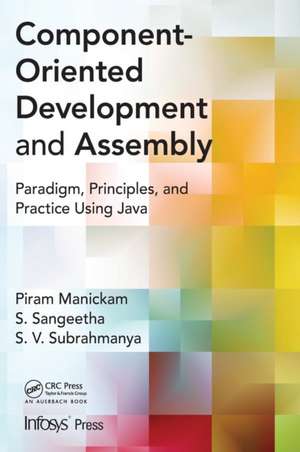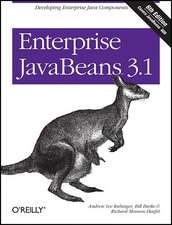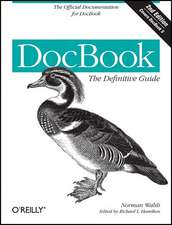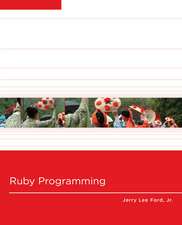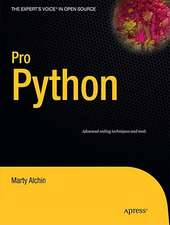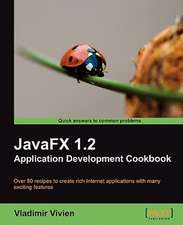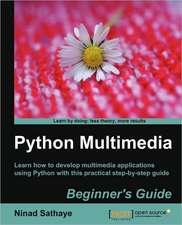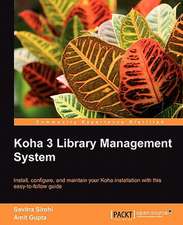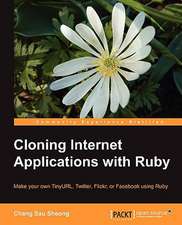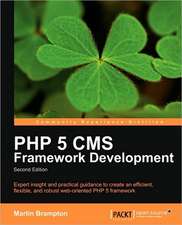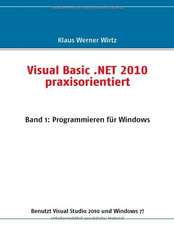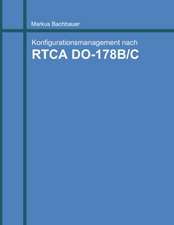Component- Oriented Development and Assembly: Paradigm, Principles, and Practice using Java: Infosys Press
Autor Piram Manickam, S. Sangeetha, S. V. Subrahmanyaen Limba Engleză Hardback – 4 dec 2013
The first part of the book provides the conceptual foundation for component-oriented software. Part II focuses on the various standard Java component models and describes how to develop a component-oriented system using these component models. Part III covers the various aspects of the component-oriented development paradigm.
Based on the authors’ research and teaching experience, the text focuses on the principles of component-oriented software development from a technical concepts perspective, designer’s perspective, programmer’s perspective, and manager’s perspective. Covering popular component development frameworks based on Java, it is suitable as a textbook for component-oriented software for undergraduate and postgraduate courses. It is also an ideal reference for anyone looking to adopt the component-oriented development paradigm.
The book provides readers with access to all the source code used in the book on a companion site (http://www.codabook.com). The source code for the CODA implementation of the case study presented in Chapter 11 is also hosted on the website. The website will also serve as a technical forum for further discussions on the topic and for any updates to the book.
Preț: 573.52 lei
Preț vechi: 716.90 lei
-20% Nou
Puncte Express: 860
Preț estimativ în valută:
109.76€ • 114.44$ • 91.22£
109.76€ • 114.44$ • 91.22£
Carte tipărită la comandă
Livrare economică 20 martie-03 aprilie
Preluare comenzi: 021 569.72.76
Specificații
ISBN-13: 9781466580992
ISBN-10: 1466580992
Pagini: 298
Ilustrații: 98 black & white illustrations, 29 black & white tables
Dimensiuni: 178 x 254 x 22 mm
Greutate: 0.79 kg
Ediția:1
Editura: CRC Press
Colecția Auerbach Publications
Seria Infosys Press
ISBN-10: 1466580992
Pagini: 298
Ilustrații: 98 black & white illustrations, 29 black & white tables
Dimensiuni: 178 x 254 x 22 mm
Greutate: 0.79 kg
Ediția:1
Editura: CRC Press
Colecția Auerbach Publications
Seria Infosys Press
Public țintă
Software programmers, software designers, and software architects.Cuprins
Component Paradigm. Software Paradigms. Component Oriented Software Paradigm. Component Principles. Theory of Software Components. Software Component Models and Frameworks. Principles of Component Based Software Engineering. Component Practices. Component Oriented Development and Assembly using OSGi. Component Oriented Development and Assembly using SCA. Architecting Component Based Systems. Component Design Principles & Patterns. Developing Components. Assembling Components. Testing Components and Component-Based Systems. Appendices.
Recenzii
The authors provide a carefully thought-out treatment of software components and component-oriented development. They do so in a manner that is, at the same time, rigorous and accessible to a spectrum of readers: from those who are generally knowledgeable in software engineering but do not have a background in component-oriented development, to those who have significant prior exposure but are looking to shore up their knowledge and develop expertise in the state of the art. ... a valuable addition to any software engineer’s bookshelf!
—Professor Nenad Medvidović, Computer Science Department, University of Southern California
—Professor Nenad Medvidović, Computer Science Department, University of Southern California
Notă biografică
Piram Manickam is an ardent technologist. During the past two decades he has worked with many software development teams and built a number of systems using various development platforms. He has a special interest in object-oriented design. He has authored many technical articles. Manickam has been practicing and teaching component-oriented development and assembly (CODA) for the last few years. He is a technical consultant and architect on many software component–based projects at Infosys. Manickam is a graduate of electronics and communication engineering from Regional Engineering College (currently NIT) in Tiruchirapalli, India.
S. Sangeetha has been in a senior technical architect role at Infosys. She has been working on Java, Java EE–related technologies, for more than 14 years. She is involved in the design and development of prototypes and POCs on several enterprise application solutions. She is also involved in grooming architects at Infosys through an Initiative called Connect Architecture. Her responsibilities include designing, developing, and delivering Java EE–related courses to various roles. She has been practicing and teaching component-oriented development and assembly (CODA) for the last few years. Sangeetha has authored many technical articles and coauthored a book titled J2EE Architecture. She has a bachelor’s degree in engineering (electronics communication engineering) from Madras University.
S. V. Subrahmanya (also known as SVS) has more than 25 years of experience in the information technology industry and academics. SVS is currently working at Infosys limited as vice president and is a research fellow at Infosys. He heads the E-Commerce Research Labs. He is also responsible for competency development of employees across the technical spectrum including new upcoming areas of technology at Infosys. SVS has published many papers in reputed journals and international conferences. He has coauthored books titled Discrete Structures, Web Services: An Introduction, J2EE Architecture, and Enterprise IT Architecture.
S. Sangeetha has been in a senior technical architect role at Infosys. She has been working on Java, Java EE–related technologies, for more than 14 years. She is involved in the design and development of prototypes and POCs on several enterprise application solutions. She is also involved in grooming architects at Infosys through an Initiative called Connect Architecture. Her responsibilities include designing, developing, and delivering Java EE–related courses to various roles. She has been practicing and teaching component-oriented development and assembly (CODA) for the last few years. Sangeetha has authored many technical articles and coauthored a book titled J2EE Architecture. She has a bachelor’s degree in engineering (electronics communication engineering) from Madras University.
S. V. Subrahmanya (also known as SVS) has more than 25 years of experience in the information technology industry and academics. SVS is currently working at Infosys limited as vice president and is a research fellow at Infosys. He heads the E-Commerce Research Labs. He is also responsible for competency development of employees across the technical spectrum including new upcoming areas of technology at Infosys. SVS has published many papers in reputed journals and international conferences. He has coauthored books titled Discrete Structures, Web Services: An Introduction, J2EE Architecture, and Enterprise IT Architecture.
Descriere
This book supplies comprehensive coverage of the principles, practice, and paradigm of component-oriented development and assembly. The first part provides the conceptual foundation for component-oriented software. Part II focuses on the various standard Java component models and describes how to develop a component-oriented system using these component models. Part III covers the various aspects of the component-oriented development paradigm. The text focuses on component oriented software development from a technical concepts perspective, designer’s perspective, programmer’s perspective, and manager’s perspective.
